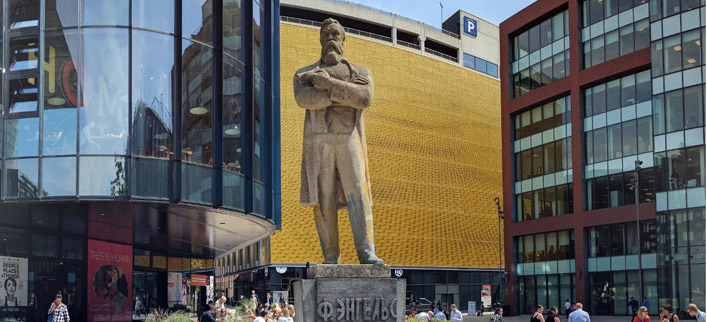
- This event has passed.
Communism in the Suburbs?/Retroactive Utopia of Socialist City

from Socialist Register 2020: Beyond Market Dystopia: New Ways of Living
Final session
Each year a new volume of the Socialist Register appears, effectively laying out for socialists and communists what are burning issues of the day—we now have 56 years of coverage, and many of the burning issues are now in a full blaze. This year’s edition was published before the global pandemic, the currently 30 million additional unemployed in the US alone, and the Minneapolis police murder of George Floyd, and with the US soon to record 200,000 coronavirus deaths, most of which could have been prevented. The whole world watched the video and responded with a movement that became more widespread than was Occupy Wall Street in 2011 or the first Black Lives Matter upsurge in 2014.
Communism in the Suburbs?
Roger Keil
In Roger’s words: “The core message here is the need to focus on the small and hidden histories, the buried stories of the everyday, the extinguished but smoldering fires at the grass roots of urban society. Both the early twentieth-century commune and the progressive reforms of mid-century in Los Angeles were not untypical for what was happening around the world at those times by way of experiments in widespread reform, or even revolution. None of these led sustainably to what the dreamers, reformers, and revolutionaries had hoped for: a different society, a new world. Ultimately, experiment and reform in housing and urban life were perverted by the bureaucracies perpetuating the survival of capitalism, as well as by the bureaucrats constructing ‘real existing socialism’ in Eastern Europe. Henri Lefebvre, addressing the state-built housing machines of the banlieue as the dreaded ‘habitat’ of the ‘society of bureaucratic consumption’, once powerfully exposed how France’s urban policy has had quite the opposite effect of what both experiment and reform had intended: ‘The population in the metropolis is regrouped into ghettos (suburbs, foreigners, factories, students), and the new cities are to some extent reminiscent of colonial cities.’ Yet in these histories we find sedimentations of possibilities that I will take up in this essay.
The Retroactive Utopia of the Socialist City
Owen Hatherley
In Owen’s words: “In the center of Manchester, you can find two artefacts of the Soviet Union’s attempt to fuse art, architecture and everyday life. One is now fairly wellknown. Standing inTony Wilson Square, a developer-owned ‘Private Public Space’ standing in front of the arts center ‘Home’, facing various new luxury office and residential units, is a statue of Friedrich Engels. For another monument without a beard, you need walk 15 minutes up Deansgate and turn off into the People’s History Museum. This riverside building, hemmed in by speculative offices and an enormous plate glass and steel Civil Justice Centre, contains the archives of the Labour Party, the Communist Party of Great Britain, and numerous trade unions. The rooms on the post-war, pre-Thatcher decades contain a particularly unusual trade union banner from the famous Grunwick Strike of 1976-78, when the mainly Asian and female workforce of a photo-processing plant in west London walked out over their particularly poor pay and conditions. Anyone who knows a bit of twentieth-century art history will recognise the source for the banner – the ‘Suprematist’ strain in early Soviet avant-garde art. The (re)discovery of the Soviet avant-garde – which eventually meant that a striking worker in Dollis Hill in 1976 could know who El Lissitzky was, and create an image based around his – is a complex story of misunderstandings and appropriations.
OWEN HATHERLEY is the author of several books on political aesthetics, and the culture editor of Tribune, which was relaunched as a print magazine and website with the support of Jacobin in 2018.
ROGER KEIL is a Professor at the Faculty of Environmental and Urban Change, York University, Toronto, Ontario
